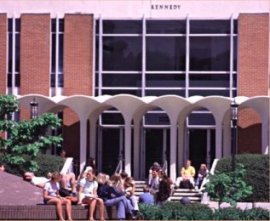History
Charlotte, North Carolina desired a public university for many years but was unable to sustain one. Students had to travel over 90 miles to find the nearest state supported university. The city submitted a bid but lost to local farmers who were willing to donate land for the campus now known as North Carolina State University.
The University of North Carolina first opened its doors in September of 1946. The enrollment was 278 students, and the school served returning soldiers from World War II. The GI Bill made it possible for the school to flourish, but in 1949, the university closed its doors. Classes were then held at Central High School after being taken over by a city school district and renamed Charlotte College. The enrollment at the two-year institution increased to 492, and school leaders began searching for a permanent site for the school.
Charlotte College joined the North Carolina Community College System and moved to its current location in 1961. In 1963, it became a 4-year institution and in 1964 the college became known as the University of North Carolina at Charlotte.
The university has since grown to 4 campuses: Charlotte Research Institution Campus, University Center (Main Campus), Uptown Charlotte Campus, and South Charlotte Campus (Ballantyne). The Main campus is self-contained and located in a wooded area with many synthetic lakes. The campus is constantly being upgraded, and many new building are being built. The Charlotte Research Institution Campus sits on 100-acres of land next to the main campus. This campus focuses on research and information technology. The Uptown Charlotte Campus focuses on evening and business courses, but in the future, the campus will house graduate level programs. The south Charlotte Campus houses the College of Computing and Informatics and a few graduate level courses.




